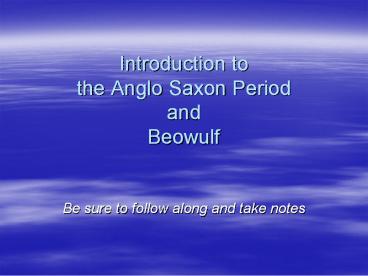Introduction to the Anglo Saxon Period and Beowulf - PowerPoint PPT Presentation
1 / 24
Title:
Introduction to the Anglo Saxon Period and Beowulf
Description:
Title: Introduction to the Anglo Saxon Period and Beowulf Author: carolyn Last modified by: Laura Parkerson Created Date: 12/7/2004 2:49:25 AM Document presentation ... – PowerPoint PPT presentation
Number of Views:345
Avg rating:3.0/5.0
Title: Introduction to the Anglo Saxon Period and Beowulf
1
Introduction to the Anglo Saxon Periodand
Beowulf
- Be sure to follow along and take notes
2
- The Anglo Saxon period began in 449
- The first people to inhabit what we now know as
Britain were the Britons. - The Jutes came from Juteland in Denmark were the
first people to cross the North Sea. - They settled in what is now known as the county
of Kent.
3
- Another group of invaders were the Angles and the
Saxons - The Britons were no match for these invaders, but
they did not give up without a fight. - It is said that King Arthur may have been the
leader of the Celtic people who were driven into
Wales.
4
- These Germanic tribes brought with them a common
language. - Old English or Anglo-Saxon.
- Anglo-Saxon England (Angleland) was said to last
until 1066.
5
- During the Anglo-Saxon period England was
divided. - The most important areas were
- Kent
- Northumbria
- Mercia
- Wessex
6
(No Transcript)
7
- During the last century of this period the
Anglo-Saxons were compelled to organize
themselves to resist further invasion from the
Vikings or Norsemen whom they called the Danes. - King Alfred of Wessex (871-899) was able to unite
his people and to force the Danes to the
northeaster half of England.
8
Alfred the Great
9
- Although the Anglo-Saxons fought among
themselves, they had a great deal in common. - They used a common language
- They shared a heroic ideal
- They had a set of traditional heroes.
- They were loyal to their leaders and tribe.
- They held a belief of fierce personal valor.
- They admired men of outstanding courage.
- Persons of rank were received with grave
courtesy. - Rulers were generous to those who were loyal
- They had a democratic habit of mind.
- They were hardy and brave
- They had a passion for fine ornaments.
10
(No Transcript)
11
- Many basic American traditions in law, conduct,
outlook, language and literature are from the
Anglo-Saxons. - One aspect of Anglo-Saxon civilization that
survives today is the names of our weekdays.
12
- Tuesday comes from Tiw, the god of war.
13
- Wednesday comes from Woden, the chief Teutonic
god.
14
- Thursday comes from Thor, the god of thunder.
15
Friday comes from Frigga, the goddess of the home.
16
- Christianity came early to Britain.
- Saint Augustine, a famous missionary, came in 597
and established a monastery at Canterbury. - He then became the first Archbishop of
Canterbury. - The Archbishops of Canterbury came to be regarded
as the Primates of England.
17
- Literature and the Arts began to evolve during
this period. - Anglo-Saxon poetry was an oral tradition.
- Caedmon was considered the first English
religious poet.
18
- An Anglo-Saxon poet was called a scop.
- He was the memory and historian of the tribe.
19
- The two most important traditions of Anglo-Saxon
poetry were the heroic and the elegiac tradition. - The Seafarer is a good example of an elegiac
poem. - The most important single poem from the
Anglo-Saxon period is the epic Beowulf.
20
- The churchmen who wrote verse generally wrote in
Latin. - The earliest prose writers and chroniclers among
the Anglo-Saxon churchmen also wrote in Latin. - The greatest of these was Bede (673-735) who was
the author of A History of the English Church and
People (731).
21
Bede
22
- Anglo-Saxon history and prose owe most to the
influences of Alfred the Great. - Alfred promoted the use of written English and
was responsible for the initiation of the
Anglo-Saxon Chronicles, the first historic record
to be kept in English. - He also formulated a code of law and created the
first English public schools
23
- Athough the Anglo-Saxon period was sometimes
considered a violent period, they made many
outstanding contributions to civilization.
24
(No Transcript)

